The Arab World’s Democracy Deficit
- Share via
TEL AVIV — In the 19th century, it was a widely held belief among certain European and American intellectuals that Catholicism and democracy were irreconcilable. Ralph Waldo Emerson, for example, once complained in a letter to Scottish historian Thomas Carlyle of “Romish priests, who sympathize, of course, with despotism.” This seems an absurd assumption today, in a world where heavily Catholic Christian Democratic parties are pillars of democracy throughout Europe.
It is equally absurd, though quite common, to assume that Islam and democracy are incompatible.
Take the case of Turkey, where a secular constitution has transformed the country over the last 80 years into a functioning, albeit deeply flawed, democracy. The country’s recently held democratic elections saw the victory of a party with strong Islamic roots that is nonetheless committed to democracy and human rights.
Iran, too, should be considered. The country’s Islamic constitution is obviously oppressive. But this same constitution guarantees elections that, while not entirely free, are not a sham. Elections are contested; women as well as men have the right to vote; and, though all candidates have to be approved by religious authorities, there are factions and nuances within the limited discourse.
President Mohammad Khatami has been elected twice against a hard-line conservative establishment candidate and, because he stands for a more open version of Islam, he was supported by young voters and women. Parliamentary debates are lively, with issues of state and religion openly discussed and voted on. In the last parliamentary elections, the reformist factions received a majority. The unelected conservative Council of Guardians still controls many aspects of public life, yet politics are lively, disputatious and much more open than just 10 years ago. Iran’s careful support of the U.S. war on the Taliban suggests how varied the world of Islam can be.
Other examples -- Bangladesh, Indonesia, even Pakistan between military dictators -- suggest that multiparty systems and elections are not alien to the Muslim world.
Yet it is a fact that in the heart of the Muslim world there is a bloc of countries where not one is democratic and there has been no real movement toward democracy: the 21 member countries of the Arab League. Even the much-publicized October parliamentary elections in tiny Bahrain -- a welcome development -- have been made irrelevant by the king’s parallel appointment of an unelected consultative council whose powers equal those of the elected assembly. Not surprisingly, the elections were boycotted by some parties, and the so-called constitutional reform turned out to be mainly a sham.
The Arab world encompasses a great variety of countries: Some are poor, such as Egypt, Algeria, Sudan and Yemen, while others are enormously rich, such as Saudi Arabia, Kuwait and the United Arab Emirates. They are small and large, populous and sparsely populated. There are monarchies and military dictatorships, benevolent and harsh. But none of their leaders was freely elected.
Moreover, at a time when regions of the world from Eastern Europe to Latin America to sub-Saharan Africa to Southeast Asia have moved toward democracy, there has never been anything comparable in any Arab country. We have seen no Arab Mikhail Gorbachev, no Arab Lech Walesa or Vaclav Havel, no Arab Solidarity Movement. No Arab dictatorial regime has ever been overthrown by a popular uprising. No Arab country has spawned a serious movement of opposition to the (unelected) powers that be.
Compare the following: A few months ago, an outspoken Iranian academic, Hashem Aghajari, was put on trial and sentenced to death for criticizing some tenets of Islam. Since his trial there have been constant student demonstrations in Tehran and other cities. At great personal risk, demonstrators have clashed with police. Reform leaders, including even some from circles around President Khatami, have called for quashing the sentence. After weeks of unrest, the conservative legal establishment has now agreed to review Aghajari’s sentence.
In Egypt, on the other hand, Egyptian sociologist Saad Eddin Ibrahim was put on trial two years ago and sentenced -- twice -- to seven years of hard labor because he dared conduct election research and look into issues of women’s rights and human rights for the Coptic Christian minority. Criticism from abroad moved the government to call for a new trial, but there has been no protest in Egypt. For two years there have been no significant popular demonstrations supporting Ibrahim, and few Egyptian intellectuals have voiced criticism of the attempt to stifle a dissenting voice.
As a 2002 United Nations Development Program report noted, “the transfer of power through the ballot box is not a common phenomenon in the Arab world.” This democracy deficit is coupled with a weakness of civil society, and an almost total absence of civil courage. It has far-reaching consequences for women, among others.
In Iran, despite the chador, women vote, and a woman is deputy speaker of the Majlis, or parliament. In Saudi Arabia, on the other hand, women are not allowed even to drive and cannot venture from home without a chaperon. In countries like Egypt and Syria, the situation is obviously different -- they are secular autocracies -- but women are nevertheless politically marginalized.
This lack of a democratic culture in Arab countries still needs an explanation, but until Sept. 11, it was not politically correct to mention it. It is now finally getting both political and scholarly attention worldwide, not because of a simplistic acceptance of a “clash of civilizations” theory but for more practical reasons. The democracy deficit in Arab societies has become a major issue for global security.
When people in Saudi Arabia and Egypt are deprived of freedom at home, they are pushed to religious fanaticism as the only way to express anger at their oppression. The 15 Saudi suicide-murderers of 9/11 were not poor or illiterate. They, as well as their Egyptian leader, Mohamed Atta, were middle-class people, relatively well educated. In an open society, they would be members of a legitimate opposition. Denied other channels of dissent, they became terrorists.
Added to this is that, in some cases -- the Saudi one especially -- official ideology focuses on depicting the West as pagan, materialistic and hateful. In Egypt, where no criticism of the government is allowed in the media, lambasting the U.S. (and Israel, of course) is allowed, and even encouraged, to divert criticism from the failures of President Hosni Mubarak’s regime.
Islam is not the enemy. But the lack of democracy in Arab countries pushes people toward religious fanaticism and terrorism. This major danger to world security must be addressed frankly and openly.
More to Read
Sign up for Essential California
The most important California stories and recommendations in your inbox every morning.
You may occasionally receive promotional content from the Los Angeles Times.













